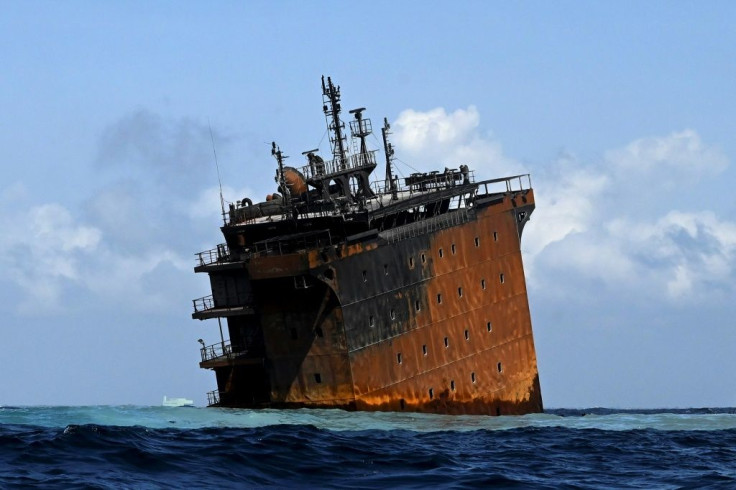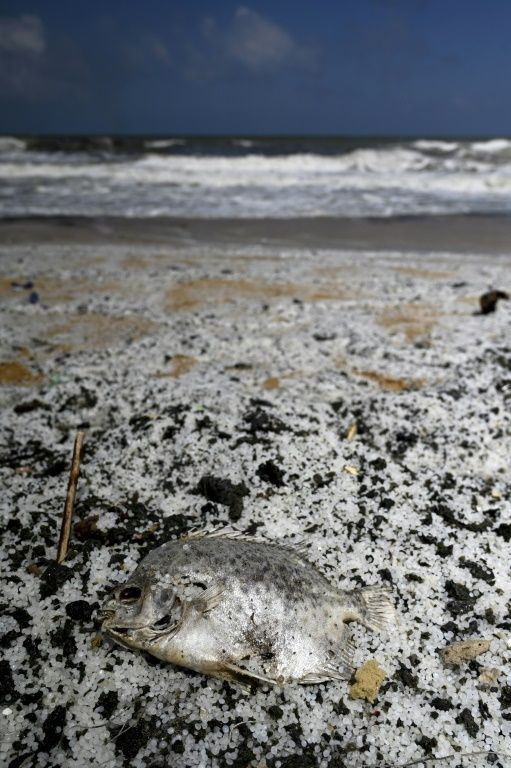Sri Lanka Sued Over Ship Disaster As Possible Oil Spill Looms
Environmentalists on Friday sued the Sri Lankan government and operators of a container ship loaded with chemicals and plastic that burned offshore for almost two weeks, as international experts prepared to deal with a possible oil spill.
The private Centre for Environment Justice (CEJ) petitioned the Supreme Court alleging that local authorities should have been able to prevent what they called the "worst marine disaster" in Sri Lanka's history.
The Singapore-registered MV X-Press Pearl has been slowly sinking into the Indian Ocean since Wednesday after a fire that raged for 13 days within sight of the coast.
Tonnes of microplastic granules from the ship have swamped an 80-kilometre (50-mile) stretch of beach which has been declared off limits for residents. Fishing in the area was also banned.
The CEJ said government inaction was "against the concepts and principles of environmental law". A hearing is yet to be fixed.

It said the crew knew of an acid leak on May 11, long before entering Sri Lankan waters, and local authorities should not have allowed the vessel in.
The legal challenge seeking unspecified damages came as foreign experts were deployed to help Sri Lanka contain a potential oil leak from the burnt-out wreckage.
Representatives from the International Tankers Owners Pollution Federation (ITOPF) and Oil Spill Response (OSR) were onshore monitoring the ship, the operators of the vessel, X-Press Feeders, said.
"They continue to coordinate with MEPA (the Marine Environment Protection Authority) and the Sri Lankan navy on an established plan to deal with any possible spill of oil and other pollutants," the Singaporean company said.
Its chief executive, Shmuel Yoskovitz, apologised to Sri Lanka for the disaster.

"I'd like to express my deep regrets and apologies to the Sri Lankan people for the harm this incident has caused to the livelihood and to the environment of Sri Lanka," Yoskovitz told Channel News Asia.
Choppy seas and poor visibility prevented navy divers from checking the hull for a second day Friday, Sri Lanka navy spokesperson Indika de Silva told AFP.
He said a team reached the sinking vessel and made a cursory inspection on Thursday, but could not carry out their mission because of poor visibility.
Meanwhile, the MEPA has readied oil dispersants and skimmers should the vessel leak its 350 tonnes of fuel oil, believed to be still in its tanks, and cause further massive environmental degradation.
An Indian coastguard vessel in the area has equipment to deal with an oil slick, according to the Sri Lankan navy, which has requested assistance with the operation.
Sri Lanka's Harbour Master Nirmal Silva told AFP Friday that no oil had leaked 48 hours after the stern submerged.
"Looking at the way the ship burnt, expert opinion is that bunker oil may have burnt out, but we are preparing for the worst-case scenario," Silva said.
The vessel was carrying 81 containers of "dangerous cargo" including acids and lead ingots.
Sri Lankan authorities believe the fire was caused by a nitric acid leak which the crew apparently knew about nine days before the blaze started.
Ports in Qatar and India had refused to offload the leaking nitric acid and the vessel arrived in Sri Lankan waters with the leak.
© Copyright AFP 2024. All rights reserved.





















